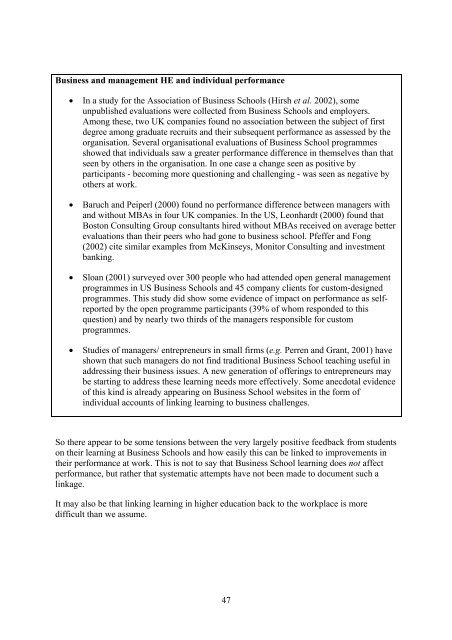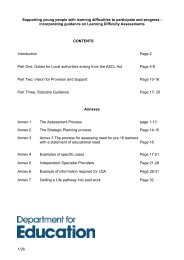The Development of Management and Leadership Capability and its ...
The Development of Management and Leadership Capability and its ...
The Development of Management and Leadership Capability and its ...
Create successful ePaper yourself
Turn your PDF publications into a flip-book with our unique Google optimized e-Paper software.
Business <strong>and</strong> management HE <strong>and</strong> individual performance<br />
• In a study for the Association <strong>of</strong> Business Schools (Hirsh et al. 2002), some<br />
unpublished evaluations were collected from Business Schools <strong>and</strong> employers.<br />
Among these, two UK companies found no association between the subject <strong>of</strong> first<br />
degree among graduate recru<strong>its</strong> <strong>and</strong> their subsequent performance as assessed by the<br />
organisation. Several organisational evaluations <strong>of</strong> Business School programmes<br />
showed that individuals saw a greater performance difference in themselves than that<br />
seen by others in the organisation. In one case a change seen as positive by<br />
participants - becoming more questioning <strong>and</strong> challenging - was seen as negative by<br />
others at work.<br />
• Baruch <strong>and</strong> Peiperl (2000) found no performance difference between managers with<br />
<strong>and</strong> without MBAs in four UK companies. In the US, Leonhardt (2000) found that<br />
Boston Consulting Group consultants hired without MBAs received on average better<br />
evaluations than their peers who had gone to business school. Pfeffer <strong>and</strong> Fong<br />
(2002) cite similar examples from McKinseys, Monitor Consulting <strong>and</strong> investment<br />
banking.<br />
• Sloan (2001) surveyed over 300 people who had attended open general management<br />
programmes in US Business Schools <strong>and</strong> 45 company clients for custom-designed<br />
programmes. This study did show some evidence <strong>of</strong> impact on performance as selfreported<br />
by the open programme participants (39% <strong>of</strong> whom responded to this<br />
question) <strong>and</strong> by nearly two thirds <strong>of</strong> the managers responsible for custom<br />
programmes.<br />
• Studies <strong>of</strong> managers/ entrepreneurs in small firms (e.g. Perren <strong>and</strong> Grant, 2001) have<br />
shown that such managers do not find traditional Business School teaching useful in<br />
addressing their business issues. A new generation <strong>of</strong> <strong>of</strong>ferings to entrepreneurs may<br />
be starting to address these learning needs more effectively. Some anecdotal evidence<br />
<strong>of</strong> this kind is already appearing on Business School websites in the form <strong>of</strong><br />
individual accounts <strong>of</strong> linking learning to business challenges.<br />
So there appear to be some tensions between the very largely positive feedback from students<br />
on their learning at Business Schools <strong>and</strong> how easily this can be linked to improvements in<br />
their performance at work. This is not to say that Business School learning does not affect<br />
performance, but rather that systematic attempts have not been made to document such a<br />
linkage.<br />
It may also be that linking learning in higher education back to the workplace is more<br />
difficult than we assume.<br />
47
















